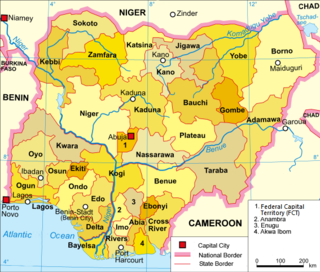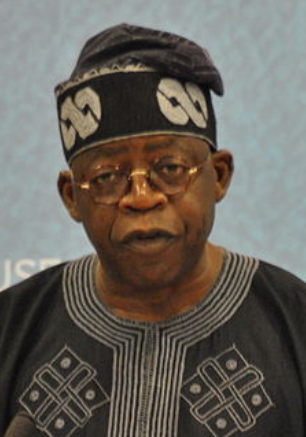The All Nigeria Peoples Party (ANPP) was a political party in Nigeria.

The Peoples Democratic Party [sic] is one of the two major contemporary political parties in Nigeria, along with its main rival, the All Progressives Congress.

Elections in Nigeria involve choosing representatives to the federal government of Nigeria and the various states in the fourth republic Nigeria. Elections in Nigeria began in 1959 with a number of political parties. It's a method of choosing leaders where the citizens have the right to vote and to be voted for. In 2023, Nigerians were getting ready for presidential elections with about 93.4 million eligible voters across the federation for the 25 February election.

The All Progressives Grand Alliance (APGA) is a political party in Nigeria.

Chief Bola Ahmed Adekunle Tinubu is a Nigerian politician who is the 16th and current president of Nigeria. He was the governor of Lagos State from 1999 to 2007, and senator for Lagos West in the Third Republic.

The All People's Party (APP) is a former Nigerian political party. It was formed in late 1998 during a transition from military to civilian rule by a coalition of associations that received considerable support under the regime of Sani Abacha.

The Fourth Republic is the current republican government of Nigeria. Since 1999, it has governed the country according to the fourth republican constitution. It was in many ways a revival of the Second Republic, which was in place between 1979 and 1983 and suffers many of the same problems, such as multiple ministries which made policy planning difficult. Nigeria adopted the constitution of the Fourth Republic on 29 May 1999.

The Second Nigerian Republic was a brief formation of the Nigerian state which succeeded the military governments formed after the overthrow of the first republic.

The Third Republic was the planned republican government of Nigeria in 1992 which was to be governed by the Third Republican constitution. In the Third Republic, there were democratically elected state governors and state assemblies and a democratically elected federal legislature. The republic was however not fully democratic as there was no democratically elected civilian president. The then military president Ibrahim Babangida's supposed transition eventually turned out to be a ploy to keep executive powers and grant the National Assembly limited legislative powers. Hence all laws passed by the Senate and House of Representatives will have to pass the National Defence and Security Council of Nigeria and finally approved by the President. So while Babangida changed the usual style adopted by preceding military leaders from Head of State to President, he will continue to postpone presidential elections and eventually annul the ultimate one held on 12 June 1993. The Third Republic can thus be described as half military and half civilian.

Presidential elections were held in Nigeria on 12 June 1993, the first since the 1983 military coup ended the country's Second Republic. The elections was the outcome of a transitional process to civilian rule spearheaded by the military ruler, Ibrahim Badamasi Babangida. The unofficial result of the election – though not declared by the National Electoral Commission (NEC) – indicated a victory for Moshood Kashimawo Olawale Abiola of the Social Democratic Party (SDP), who defeated Bashir Tofa of the National Republican Convention (NRC). The winner of the election was thus never declared as the elections were annulled by Babangida, citing electoral irregularities. The annulment led to protests and political unrest, including the resignation of Babangida and a weak interim civilian government, and culminated in the continuation of military rule in the country with Sani Abacha ascending to power as the military head of state via a bloodless coup later in the year.
The table below lists elected Nigerian senators of the 7th National Assembly. The Senate includes three senators from each of the 36 states, plus one minister for the Federal Capital Territory, Abuja. The 7th National Assembly was in May 2011.

The Congress for Progressive Change (CPC) was a political party founded in Nigeria in 2009 in preparation for the April 2011 elections. It was the 63rd political party to be founded in the country.

The Nigerian state governors 2011–2015 term formally begins in May 2011 for the 26 state Governors in Nigeria elected in April 2011. In the 10 other states, elections were delayed until the current incumbent had served their full term. Governors are normally elected for a four-year term during the national elections in which the President and members of the upper and lower house are also elected, as are the state legislators. In some cases, the first officeholder may be replaced by another, for example through death, impeachment or if an election is annulled.

Owelle Rochas Anayo Okorocha is a Nigerian politician of Igbo extraction, from Imo State. He is the senator representing Imo West senatorial district at the 9th Nigerian Senate. From 2011 to 2019 he served as Governor of Imo State.

The All Progressives Congress (APC) is one of the two major contemporary political parties in Nigeria, along with the Peoples Democratic Party (PDP). Founded on 6 February 2013 from a merger of Nigeria's three largest opposition parties, the party came to power following the victory of party candidate Muhammadu Buhari in the 2015 presidential election. This marked the first time in Nigerian history that an opposition party unseated a governing party and power was transferred peacefully.

General elections were held in Nigeria on 28 and 29 March 2015, the fifth quadrennial election to be held since the end of military rule in 1999. Voters elected the President and members to the House of Representatives and the Senate. The incumbent president, Goodluck Jonathan, sought his second and final term.
The 2015 Kogi State Gubernatorial election was held on 21 November 2015 to elect a governor for Kogi State. The last Kogi state gubernatorial election was held in 2011. The incumbent governor, Captain Idris Wada, ran for re-election against the former governor, Prince Abubakar Audu, the candidate of the All Progressives Congress. Kogi State has a different governorship election calendar from other states of the Nigerian Federation. This happened in 2007, when the Appeal Court affirmed annulment of the election of the incumbent, Ibrahim Idris for electoral irregularities and ordered a fresh election in a case filed by Abubakar Audu.

General elections were held in Nigeria on 23 February 2019 to elect the President, Vice President, House of Representatives and the Senate. The elections had initially been scheduled for 16 February, but the Electoral Commission postponed the vote by a week at 03:00 on the original polling day, citing logistical challenges in getting electoral materials to polling stations on time. In some places, the vote was delayed until 24 February due to electoral violence. Polling in some areas was subsequently delayed until 9 March, when voting was carried out alongside gubernatorial and state assembly elections.

General elections were held in Nigeria on 25 February 2023 to elect the president and vice president and members of the Senate and House of Representatives. Incumbent President Muhammadu Buhari was term-limited and could not seek re-election for a third term. This election was seen as the tightest race since the end of military rule in 1999.

The 2023 Nigerian elections were held in large part on 25 February and 11 March 2023. The president and vice president were elected on 25 February, with incumbent President Muhammadu Buhari ineligible to run, being term-limited. Additionally, there were also elections on the same day for the Senate and the House of Representatives. On 11 March, twenty-eight gubernatorial elections were held alongside elections to state houses of assembly in all 36 states. Three additional gubernatorial elections will be held later in the year alongside potential rerun elections for regularly scheduled elections annulled from earlier in the year.













